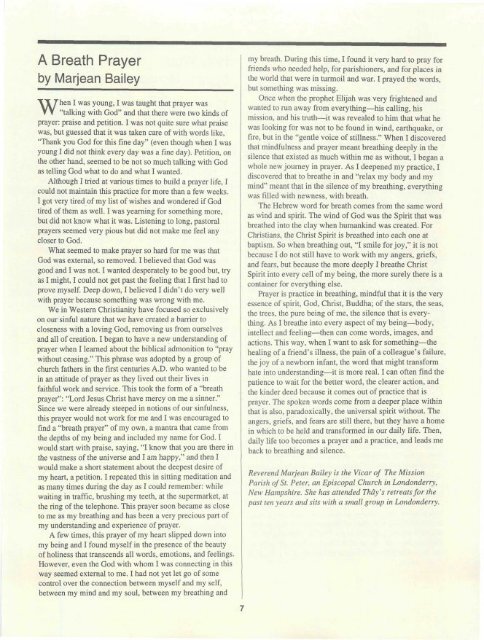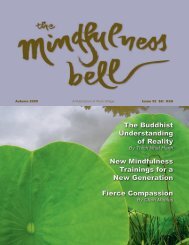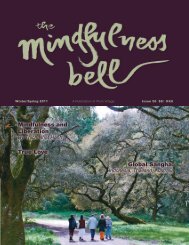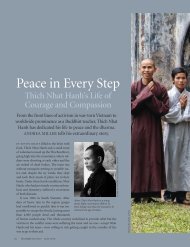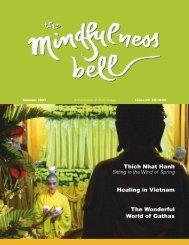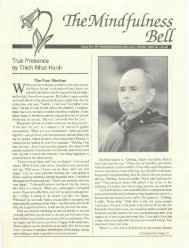The Practice of Prayer byThich Nhat Hanh - The Mindfulness Bell
The Practice of Prayer byThich Nhat Hanh - The Mindfulness Bell
The Practice of Prayer byThich Nhat Hanh - The Mindfulness Bell
Create successful ePaper yourself
Turn your PDF publications into a flip-book with our unique Google optimized e-Paper software.
A Breath <strong>Prayer</strong><br />
by MarjeanBailey<br />
When I was young, I was taught that prayer was<br />
"talking with God" and that there were two kinds<strong>of</strong><br />
prayer: praise and petition. I was not quite sure what praise<br />
was,but guessed that it was taken care <strong>of</strong> with words like,<br />
"Thank you God for this fine day" (even though when Iwas<br />
young Idid not think every day was afine day). Petition, on<br />
the other hand, seemed to be not so much talking with God<br />
as telling God what to do and what I wanted.<br />
Although Itried at various times to build a prayer life, I<br />
could not maintain this practice for more than afew weeks.<br />
I gotvery tired <strong>of</strong> my list <strong>of</strong> wishes and wondered if God<br />
tired <strong>of</strong> them as well. I was yearning for something more,<br />
but did notknow what it was. Listening to long, pastoral<br />
prayers seemed very pious but did not make me feel any<br />
closer to God.<br />
What seemed to make prayer so hard for me was that<br />
God was external, so removed. Ibelieved that God was<br />
good and I was not. Iwanted desperately to be good but, try<br />
as Imight, Icould not get past the feeling that I first had to<br />
prove myself. Deep down, I believed I didn't do very well<br />
with prayer because something was wrong with me.<br />
Wein Western Christianity have focused so exclusively<br />
onour sinful nature that we have created a barrier to<br />
closeness with a loving God, removing us from ourselves<br />
and all <strong>of</strong> creation. Ibegan to have anew understanding <strong>of</strong><br />
prayer when I learned about the biblical admonition to "pray<br />
without ceasing." This phrase was adopted by a group<strong>of</strong><br />
church fathers in the first centuries A.D. who wanted tobe<br />
in an attitude <strong>of</strong> prayer as they lived out their lives in<br />
faithful work and service. This took the form <strong>of</strong> a "breath<br />
prayer": "Lord Jesus Christ have mercy on me a sinner."<br />
Since we were already steeped in notions <strong>of</strong> our sinfulness,<br />
this prayer would not work for me and I was encouraged to<br />
find a "breath prayer" <strong>of</strong> my own, a mantra that came from<br />
the depths <strong>of</strong> my being and included my name for God. I<br />
would start with praise, saying, "I know that you are there in<br />
the vastness <strong>of</strong> the universe and I am happy," and then I<br />
would make a short statement about the deepest desire<strong>of</strong><br />
my heart, a petition. Irepeated this in sitting meditation and<br />
as many times during the day as Icould remember: while<br />
waiting in traffic, brushing my teeth, at the supermarket, at<br />
the ring <strong>of</strong> the telephone. This prayer soon became as close<br />
to me as my breathing and has been a very precious part<strong>of</strong><br />
my understanding and experience <strong>of</strong> prayer.<br />
Afew times, this prayer <strong>of</strong> my heart slipped down into<br />
my being and I found myself in the presence <strong>of</strong> the beauty<br />
<strong>of</strong> holiness that transcends all words, emotions, and feelings.<br />
However, even the God with whom Iwas connecting in this<br />
way seemed external to me. Ihad not yet let go <strong>of</strong> some<br />
control over the connection between myself and my self,<br />
between my mind and my soul, between my breathing and<br />
my breath. During this time, Ifound it very hard to pray for<br />
friends who needed help, for parishioners, and for places in<br />
the world that were in turmoil and war. I prayed the words,<br />
but something was missing.<br />
Once when the prophet Elijah was very frightened and<br />
wanted to run away from everything—his calling, his<br />
mission, and his truth—it was revealed to him that what he<br />
was looking for was not to be found in wind, earthquake, or<br />
fire, but in the "gentle voice <strong>of</strong> stillness." When I discovered<br />
that mindfulness and prayer meant breathing deeply in the<br />
silence that existed as much within me as without, I began a<br />
whole new journey in prayer. As I deepened my practice, I<br />
discovered that to breathe in and "relax my body and my<br />
mind" meant that in the silence <strong>of</strong> my breathing, everything<br />
was filled with newness, with breath.<br />
<strong>The</strong> Hebrew word for breath comes from the same word<br />
as wind and spirit. <strong>The</strong> wind <strong>of</strong> God was the Spirit that was<br />
breathed into the clay when humankind was created. For<br />
Christians, the Christ Spirit is breathed into each one at<br />
baptism. So when breathing out, "I smile for joy," it is not<br />
because I do not still have to work with my angers, griefs,<br />
and fears, but because the more deeply I breathe Christ<br />
Spirit into every cell <strong>of</strong> my being, the more surely there is a<br />
container for everything else.<br />
<strong>Prayer</strong> is practice in breathing, mindful that it is the very<br />
essence <strong>of</strong> spirit, God, Christ, Buddha; <strong>of</strong> the stars, the seas,<br />
the trees, the pure being <strong>of</strong> me, the silence that is everything.<br />
As I breathe into every aspect <strong>of</strong> my being—body,<br />
intellect and feeling—then can come words, images, and<br />
actions. This way, when I want to ask for something—the<br />
healing <strong>of</strong> a friend's illness, the pain <strong>of</strong> a colleague's failure,<br />
the joy <strong>of</strong> a newborn infant, the word that might transform<br />
hate into understanding—it is more real. I can <strong>of</strong>ten find the<br />
patience to wait for the better word, the clearer action, and<br />
the kinder deed because it comes out <strong>of</strong> practice that is<br />
prayer. <strong>The</strong> spoken words come from a deeper place within<br />
that is also, paradoxically, the universal spirit without. <strong>The</strong><br />
angers, griefs, and fears are still there, but they have a home<br />
in which to be held and transformed in our daily life. <strong>The</strong>n,<br />
daily life too becomes a prayer and a practice, and leads me<br />
back to breathing and silence.<br />
Reverend Marjean Bailey is the Vicar <strong>of</strong> <strong>The</strong> Mission<br />
Parish <strong>of</strong> St. Peter, an Episcopal Church in Londonderry,<br />
New Hampshire. She has attended Thdy's retreats forthe<br />
past ten years and sits with a small group in Londonderry.


